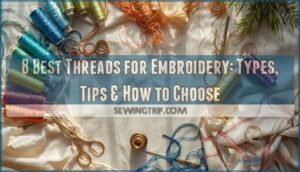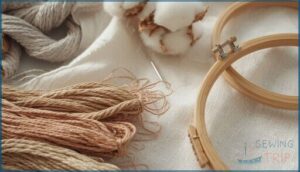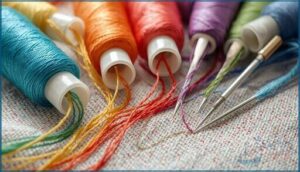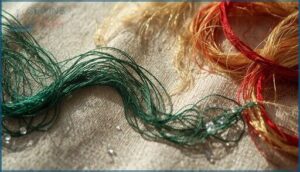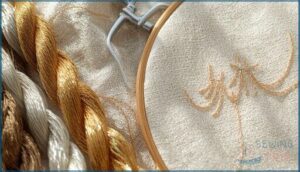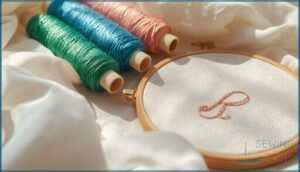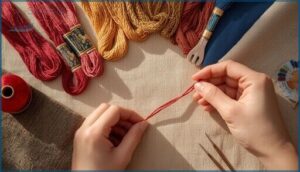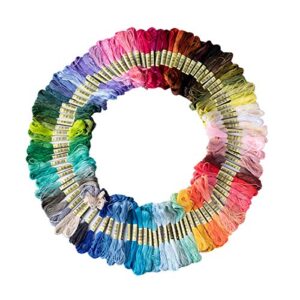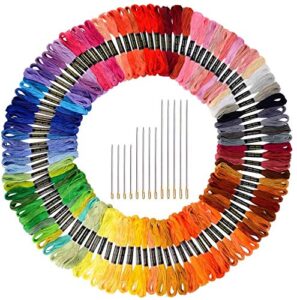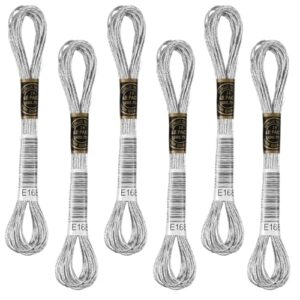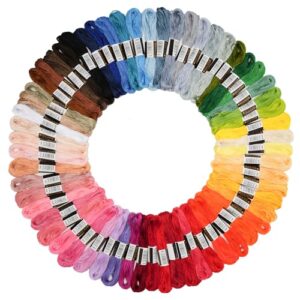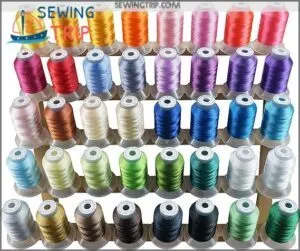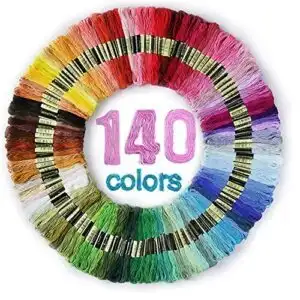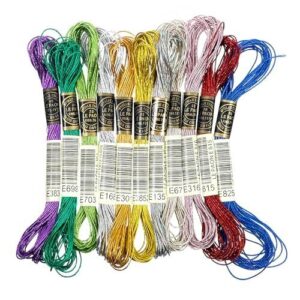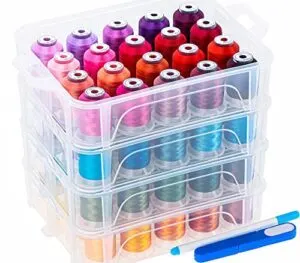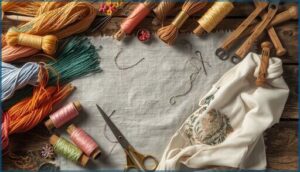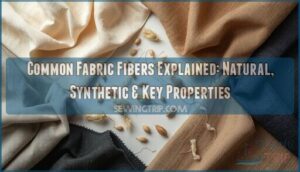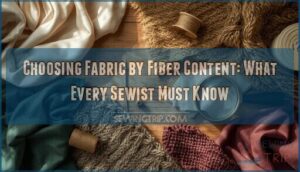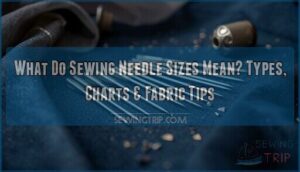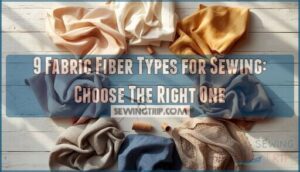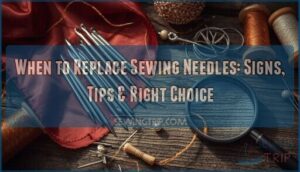This site is supported by our readers. We may earn a commission, at no cost to you, if you purchase through links.
Your embroidery won’t look right if you pick the wrong thread choice. The stitches might pucker. The colors could fade after one wash. Or that beautiful design ends up looking flat and lifeless on the fabric.
Thread choice affects everything from how your needle glides through material to whether your work survives years of handling. Cotton breathes and presses clean but lacks the punch of polyester thread. Silk glows with luxury yet demands gentler care.
Even thread weight matters—40-weight flows through machines while 12-weight creates bold hand-stitched lines. The best thread for embroidery matches your fabric type, project goals, and the finish you want to achieve. Once you understand how material, weight, and sheen work together, you’ll choose threads that make your designs shine.
Table Of Contents
What Makes a Thread Best for Embroidery
Not all embroidery threads are created equal. The best ones combine the right material, weight, and finish to match your fabric and design goals.
For everyday projects at home, choosing from quality thread sets for home use gives you reliable color variety without sacrificing strength or finish.
Let’s break down what separates quality thread from the rest.
Material Types and Their Effects
Material Selection shapes everything from how your stitches look to how long they last. Cotton Thread breathes beautifully and absorbs dye evenly, giving you that classic matte finish on natural fabrics.
Polyester Thread brings serious Thread Durability and Color Retention, especially on synthetic blends. Silk delivers natural sheen but needs gentler handling. Your choice of Embroidery Thread Materials directly affects Fabric Compatibility and Texture Impact in every project.
Thread Weight and Thickness
Weight Standards matter just as much as material when you’re choosing Embroidery Thread. Thread Weight runs from 3 to 60, with higher numbers meaning finer thread.
For machine work, 40 weight accommodates most projects smoothly. Hand embroidery shines with 12 weight for bold lines.
Thickness Variance and Ply Adjustment let you customize coverage. Core Construction affects strength, while proper Thread Tension prevents puckering across all Thread Types and Embroidery Techniques.
Sheen, Finish, and Visual Impact
Thread Sheen transforms how your embroidery catches light and reads on fabric. Cotton gives a soft matte finish, while polyester delivers bright reflective effects that pop. Silk blends boost visual texture with a luxurious glow.
Here’s how sheen shapes your work:
- Fabric Interaction changes with light versus dense weaves
- Color Depth intensifies under synthetic thread quality
- Thread Colors shift slightly with metallic finishes
- Colorfastness preserves brightness through washes
Strength, Durability, and Colorfastness
Sheen is just one part of what makes a thread excel. Beyond appearance, you need fibers that hold up under stress and keep their color through years of wear.
Polyester shows about 30 percent higher tensile strength than cotton, handling tight machine tension and dense designs without snapping. That’s why it’s the go-to for uniforms and sportswear. Rayon feels soft but weakens faster under heat and washing, while cotton suits heirloom projects that need high-temperature pressing.
Polyester’s thirty percent strength advantage over cotton makes it the preferred thread for uniforms and sportswear that endure repeated stress
Here’s a Material Comparison for Thread Longevity and Fabric Resistance:
| Thread Type | Strength & Durability | Color Retention & Colorfastness |
|---|---|---|
| Polyester | Runs 800+ stitches/min; resists breaking, abrasion | Keeps 85–90% color after 50 washes; UV resistant |
| Cotton | Lower abrasion resistance; lasts 50–100 years stored | Fades faster in sun and repeated washing |
| Rayon | Tops out near 600 stitches/min; prone to snapping | Loses color quicker with hot water or harsh detergents |
For Embroidery Performance on high-use items, choose polyester. It resists bleach, chlorine, and outdoor UV for three to five years. Cotton works well for quilting, but polyester wins for Thread Quality when you need lasting vibrancy and strength.
Always test a sample wash to confirm colorfastness before committing to your full design. For a deeper dive into polyester thread durability benefits, review this expert guide.
Types of Embroidery Threads Explained
You’ll find embroidery threads in several distinct materials, each with its own strengths and best uses. Some threads work beautifully for delicate hand embroidery, while others handle the speed and tension of machine stitching without breaking.
Let’s walk through the main types so you know exactly what each one brings to your projects.
Cotton Embroidery Threads
You’ll find cotton threads are the backbone of hand embroidery and quilting for good reason. The mercerization process gives them strength and that signature sheen you’re after.
Cotton thread composition relies on long staple fibers that create smooth, even stitches. Thread weight systems range from thick 6-weight for bold work to delicate 40-weight for fine details.
When choosing embroidery threads, cotton fiber strength and proper embroidery thread finishing guarantee your designs last through countless washes.
Polyester Embroidery Threads
Polyester thread brings serious machine embroidery muscle with tensile strength that withstands high speeds without fraying. You’ll appreciate how polyester benefits include UV resistance and colorfastness tips that keep colors vibrant through countless washes.
This embroidery thread works across fabric compatibility ranges, from lightweight cotton to heavy canvas. Thread durability makes polyester thread ideal for embroidery machines, giving you reliable results whether you’re stitching logos or detailed fills.
Silk and Blended Threads
You’ll notice silk thread glides through fabric with a natural sheen that catches light beautifully. Blended fibers mix silk with polyester to boost fiber durability while keeping that luxurious glow.
These thread types work across embroidery techniques from satin stitches to portrait work. When checking embroidery thread reviews or using a thread selection guide, watch thread tension since silk stretches less than synthetic embroidery thread.
Metallic and Specialty Threads
Metallic thread adds sparkle to any embroidery project with aluminum or copper coatings wrapped around a polyester core. You’ll find specialty yarns with iridescent effects that shift colors as light changes.
These fiber blends work best when you slow your machine speed and use a larger needle. Thread finishes range from mirror shine to antique patina, letting you match embroidery techniques to your creative vision.
Rayon Threads for Decorative Stitching
Rayon thread gives your decorative stitching a silk-like glow that makes monograms and motifs pop on any fabric. This embroidery thread type glides smoothly through machines when you match thread weight to your design needs.
- 40-weight rayon suits detailed work and fine script
- Jewel tones and pastels offer hundreds of color palette options
- High sheen finish stays vibrant after gentle washing
- Fresh needles prevent shredding during high-speed embroidery
- Light tension adjustments accommodate rayon’s stretch for better stitching techniques
Rayon threads are also valued for their eco-friendly qualities, with biodegradable thread options supporting environmentally conscious embroidery.
Key Factors When Choosing Embroidery Thread
Picking the right embroidery thread isn’t just about grabbing the prettiest color off the shelf. You need to think about what you’re stitching on, how it’ll be used, and what kind of look you’re after.
Let’s walk through the key things that’ll help you make smart choices every time.
Matching Thread to Fabric Type
Your fabric types dictate thread selection more than you might think. Cotton thread gives you a matte finish on natural fabrics, while silk creates smooth coverage on satin.
Fabric weight affects thread tension settings too. Fiber blends often work best on woven materials like linen. When you match texture and consider fabric and thread compatibility, your embroidery thread types perform beautifully without puckering or breaking.
Selecting Thread Color and Shade
Color harmony comes first when you’re building your color palette. Hold each thread against your fabric in natural light to test shade depth and avoid surprises. Check dye lot codes if you need multiple skeins—batches vary slightly.
Colorfastness matters for wash durability. Use colour theory to pair complementary tones or analogous shades. Thread finish affects how colors appear, so test before committing to your thread selection.
Assessing Thread Texture and Sheen
Thread texture shapes how light plays across your finished design. Cotton’s matte finish delivers that vintage hand-stitched charm, while polyester’s slick smoothness catches highlights on satin fills. Silk blends glow softly, and metallic thread creates mirror-like accents on dark fabrics.
- Fine threads suit micro stippling and dense satin stitches
- Medium weight threads excel at backstitch and clean outline work
- High sheen threads emphasize cutwork for dramatic contrast
- Matte textures create rustic looks on linen
- Slippery glossy threads need careful tension adjustments
Fiber types directly affect sheen levels and texture variation in your embroidery threads.
Evaluating Brand Quality and Reputation
Once you’ve found a texture that suits your style, brand quality becomes your safety net. Established thread brands like DMC Threads maintain industry standards and thread certification that protect your hours of work. Quality control processes guarantee consistent dye lots and minimal fraying.
| Quality Signal | What to Check | Why It Matters |
|---|---|---|
| Customer Reviews | Star ratings across retailers | Shows real-world performance |
| Thread Certification | Öko-Tex or ASTM labels | Confirms colorfastness standards |
| Brand Loyalty | Repeat purchase patterns | Indicates reliable thread quality review |
| Lot Codes | Clear spool labeling | Facilitates color matching |
| Warranty Terms | Replacement policies | Reflects manufacturer confidence |
Thread brand analysis reveals which companies stand behind their embroidery thread with responsive support and transparent testing data.
Considering Project Requirements and Budget
Project planning starts with honest cost estimation. Polyester threads slash expenses by thirty to sixty percent compared to silk, while metallic options add a fifteen to twenty-five percent premium.
Your budget analysis should match thread weight and thread brands to your embroidery project planning goals. Thread optimization means choosing quality that fits your timeline—proven thread quality review data prevents costly do-overs. Smart resource allocation balances ambition with reality.
Top 8 Best Threads for Embroidery
You’ve learned what to look for in quality embroidery thread. Now let’s talk about specific brands and products that deliver on those promises.
Here are eight threads that stand out for their reliability, color range, and performance across different embroidery projects.
1. Rainbow Embroidery Floss String
If you want a spectrum of color in every stitch, this rainbow floss delivers. XLSFPY gives you 50 different rainbow shades in one kit, with each skein running 8.75 yards long.
The cotton thread splits into six strands so you can go delicate or bold depending on your project. It’s flexible and resists pilling, which means your friendship bracelets and holiday decorations will hold up. Just handle it gently—this floss can tangle if you’re not careful during stitching.
| Best For | Crafters who want a wide variety of rainbow colors for friendship bracelets, kids’ projects, or casual embroidery without breaking the bank. |
|---|---|
| Material | Cotton |
| Color Variety | 50 rainbow colors |
| Length per Skein/Spool | 8.75 yards |
| Suitable For | Crafts, cross stitch, bracelets |
| Brand | XLSFPY |
| Limitations | May tangle, color issues |
| Additional Features |
|
- 50 different rainbow colors give you tons of creative options in one kit
- Flexible cotton thread resists pilling and holds up well for bracelets and decorations
- Each skein is a decent length at 8.75 yards, so you get plenty to work with
- Tangles easily if you’re not careful while working with it
- Not high-quality enough for serious cross stitch or fine embroidery work
- Some users received packages with missing colors or inaccurate color codes
2. Paxcoo Embroidery Floss Thread Set
When you need reliability and range, Paxcoo delivers 124 skeins in 124 colors. Each skein gives you 8 meters of polyester-cotton blend that resists fading through multiple washes.
The six-strand construction lets you adjust thickness for fine details or bold fills. It’s beginner-friendly with clear color codes on every skein, and the set often includes gold eye needles to get you started. Just note that some colors repeat and neutral tones are limited, so plan accordingly for your palette.
| Best For | Crafters who want a large variety of vibrant colors for cross-stitch, friendship bracelets, and embroidery projects without spending a fortune. |
|---|---|
| Material | Polyester-Cotton |
| Color Variety | 124 colors |
| Length per Skein/Spool | 8.75 yards |
| Suitable For | Cross-stitch, needlecraft, bracelets |
| Brand | PAXCOO |
| Limitations | Color repeats, tangling |
| Additional Features |
|
- 124 different colors give you tons of creative options for any project
- 8-meter skeins with 6-strand construction let you customize thickness for detailed or bold work
- Polyester-cotton blend resists fading through washes and holds up well over time
- Some colors repeat in the set, so you won’t get 124 truly unique shades
- Limited neutral tones make it tricky for projects needing beiges, grays, or earth tones
- Threads can tangle easily if you’re not careful when separating strands
3. Metallic Silver Embroidery Floss String
Shimmer catches light like nothing else when you pick metallic silver floss. This six-skein set wraps 8 meters of polyester-based thread in a reflective mylar coating that brightens outlines and adds luxe highlights without overwhelming your design.
The foil layer resists flaking through standard embroidery speeds when you adjust tension correctly. You’ll want sharp needles and short stitches on cotton or linen to prevent cracking at turns. Air-dry finished pieces to keep the shine intact, and avoid high heat that dulls the coating.
| Best For | Crafters who want to add eye-catching metallic accents to embroidery, bracelets, or clothing without spending a lot on specialty thread. |
|---|---|
| Material | Polyester |
| Color Variety | Silver |
| Length per Skein/Spool | 8 meters |
| Suitable For | Embroidery, clothing, art |
| Brand | Unbranded |
| Limitations | Material inconsistency, limited color |
| Additional Features |
|
- Reflective mylar coating creates a luxurious shine that stands out in any handmade project
- Six skeins with 8 meters each give you plenty of length for multiple designs
- Polyester base resists fading and fraying better than cotton alternatives
- Limited to silver only, so you can’t mix metallic colors in one order
- Product descriptions conflict on material type (polyester vs. plastic), which raises quality questions
- No care instructions provided, leaving you to guess how to wash finished projects safely
4. Rainbow Embroidery Floss Thread Set
Seventy skeins open up endless shading options when you choose this cotton rainbow set. Each 8.7-yard skein holds six divisible strands that you can separate for delicate detail or bundle for bold coverage.
The mercerized finish reduces fraying and adds subtle luster without overpowering fabric texture. You’ll find the color chart speeds up selection during gradient work.
Store skeins in their labeled packaging to prevent tangling, and keep them in a cool dry spot away from sunlight. The set accommodates cross stitch, friendship bracelets, and surface embroidery equally well.
| Best For | Crafters who want a wide color palette for cross stitch, friendship bracelets, and embroidery projects without needing to buy individual skeins. |
|---|---|
| Material | Cotton |
| Color Variety | 70 rainbow colors |
| Length per Skein/Spool | 8.7 yards |
| Suitable For | Cross stitch, embroidery, DIY |
| Brand | SHEYONGBY |
| Limitations | Fraying, color bleeding |
| Additional Features |
|
- 70 vibrant colors give you plenty of shading and gradient options for detailed work
- Six-strand construction lets you customize thread thickness for different techniques
- Mercerized cotton finish adds luster and helps reduce fraying during stitching
- Some users report fraying issues despite the mercerized finish
- 8.7 yards per skein may run out quickly on larger projects
- Quality consistency can vary between colors and skeins
5. Brothread Polyester Embroidery Thread Kit
Sixty-four spools deliver 1,100 yards each, giving you serious mileage for large-scale projects without constant color swaps. This polyester kit works seamlessly with Brother, Janome, Singer, and most embroidery machines that accept standard spools.
The 40-weight thread manages dense fills and fine lettering equally well, and its tensile strength cuts down on mid-design breaks. Polyester holds color through repeated washing better than rayon, so your uniform logos and workwear won’t fade quickly.
The included color chart simplifies software matching when you’re digitizing custom designs.
| Best For | Embroiderers running high-volume projects like uniforms, workwear, or linens who need durable thread that won’t fade after repeated washing. |
|---|---|
| Material | Polyester |
| Color Variety | 40 colors |
| Length per Skein/Spool | 500 meters |
| Suitable For | Embroidery, sewing, quilting |
| Brand | New brothread |
| Limitations | No wood rack, breakage |
| Additional Features |
|
- 40 spools with 550 yards each give you plenty of thread for large-scale designs without running out mid-project
- Strong polyester construction resists breaking during dense fills and maintains color fastness through multiple wash cycles
- Works with Brother, Babylock, Janome, Singer, Pfaff, and Bernina machines right out of the box
- No storage rack included, so you’ll need to buy one separately or find another way to organize 40 spools
- May need specific needle sizes and proper bobbin thread to prevent fraying issues
- Some users report having to notch the spools manually to keep loose thread ends secure
6. Lovimag Embroidery Floss Set
One hundred forty cotton skeins give you enough color variety to tackle gradients, florals, and friendship bracelets without hunting for extra shades. Each skein runs 8.75 yards and separates into six strands, so you control thickness based on your fabric weight.
The rainbow palette spans bright hues and subtle neutrals, making it easy to blend shades for dimensional stitching. Some labels stick to the thread a bit, but the cotton itself stays smooth and resists fading through washes. It’s a solid starter set that won’t break your budget.
| Best For | Crafters who want a wide color range for embroidery, cross-stitch, and friendship bracelets without spending a fortune. |
|---|---|
| Material | Cotton |
| Color Variety | 140 colors |
| Length per Skein/Spool | 8.75 yards |
| Suitable For | Bracelets, crafts, embroidery |
| Brand | LOVIMAG |
| Limitations | Label adhesive, color mismatch |
| Additional Features |
|
- 140 colors give you plenty of options for gradients and detailed projects
- Each 8.75-yard skein separates into six strands so you can adjust thickness
- 100% cotton holds up well through washing and resists fading
- Labels sometimes stick to the thread and leave residue
- Color balance leans toward neutrals instead of all vibrant shades
- Some skeins arrive tangled or knotted
7. Metallic Embroidery Floss Thread
If you want a bright accent for outlines and decorative details, metallic floss delivers that shimmer. This polyester thread bundles twelve filaments around a core, catching light from multiple angles. It measures about a millimeter in diameter, so it makes a visible statement without overwhelming finer fabrics.
Fraying can happen, especially with longer strands. Keep your working length between six and twelve inches, and consider threading fewer strands through your needle. That simple tweak reduces wear at the fabric entry point and keeps the shine intact.
| Best For | Crafters who want to add eye-catching metallic accents to cross-stitch, embroidery, or decorative projects without needing professional-level skills. |
|---|---|
| Material | Polyester |
| Color Variety | 11 colors |
| Length per Skein/Spool | 8 meters |
| Suitable For | Cross-stitch, DIY, embellishments |
| Brand | Unbranded |
| Limitations | Hand wash only, limited colors |
| Additional Features |
|
- Comes with 12 strands per bundle in 11 vibrant colors, giving you plenty of options for shimmer and sparkle
- Fade-resistant polyester holds its color well, so your finished work keeps looking fresh
- Easy to cut and work with for both beginners and experienced stitchers
- Hand wash only, which limits use on items that need frequent cleaning
- Can fray with longer working lengths, so you need to keep strands short (6-12 inches)
- Only 11 colors available, which might not cover all your project needs if you want more variety
8. New Brothread Embroidery Thread Set
When you need more than sparkle, the New Brothread set covers twenty-five variegated colors in one compact box. Each spool holds five hundred meters of forty-weight polyester, giving you enough yardage to finish large designs without mid-project color hunting.
The variegated transitions blend multiple tones in a single strand, letting you build depth without swapping spools. Because the thread holds its color through repeated washes, you can trust it for aprons, uniforms, and other items that see frequent laundering.
| Best For | Embroiderers who work on large multicolor projects and want a comprehensive thread collection with organized storage that works across multiple machine brands. |
|---|---|
| Material | Polyester |
| Color Variety | 80 colors |
| Length per Skein/Spool | 500 meters |
| Suitable For | Embroidery, sewing, crafts |
| Brand | New brothread |
| Limitations | Thread starting difficulty, box fiddly |
| Additional Features |
|
- 80 spools with 500 meters each give you extensive color options and enough yardage to complete big designs without running out mid-project
- Comes with helpful extras like thread nets, yarn snips, and a color chart that match Janome and Robison-Anton standards
- Four-layer storage box keeps everything organized and makes it easy to grab and go for classes or different workspaces
- Thread ends can be tricky to find and pull from the spools since there aren’t built-in slots to secure them
- Storage box clips can be fiddly to snap together properly when you’re setting it up or putting it away
- Finding exact replacement colors in the same 500-meter spool size can be difficult if you run out of a specific shade
Tips for Selecting and Caring for Embroidery Thread
Picking the right thread is only half the battle. How you store it, handle it, and adjust your tools makes all the difference in getting clean stitches that last.
Let’s walk through a few practical ways to keep your threads in top shape and get the most out of every project.
Proper Storage to Prevent Fading
Your embroidery threads deserve proper storage solutions to maintain their color protection and durability. Keep them in a cool, dry place away from direct sunlight to prevent fading.
Humidity control matters too—aim for 40 to 60 percent to preserve thread weight and structure. Use breathable containers and rotate your embroidery floss stock every six months for best thread preservation results.
Handling Threads to Avoid Tangles
Tangled embroidery threads can derail your project before you even start stitching. Use thread nets on larger thread cones to stop unwinding mishaps, and keep spool management organized by color family.
Check your needle alignment regularly to maintain clean thread pathing. Proper tangle prevention saves time and frustration, letting you focus on creating beautiful work instead of wrestling with knots and loops.
Adjusting Machine Settings for Thread Type
Getting the right stitch optimization starts with matching your machine calibration to your thread weight. Polyester thread cones need tighter tension settings than rayon—around 120 to 150 grams versus 100 to 130. Needle selection matters too: use 75/11 for standard threads, larger for heavier ones.
Speed adjustment is vital for metallics; drop to 650 stitches per minute to prevent shredding. Your sewing machine settings and embroidery machine usage directly impact stitch quality.
Blending and Layering Threads for Effects
Pair stranded cotton with metallic embroidery threads to add shimmer without overpowering your design. Thread blending creates color gradation when you layer adjacent shades from the same thread brands.
Stitch density controls how much texture effects show—higher density hides underlying layers while lower reveals more variation. Always test layering techniques on fabric swatches to confirm how different thread weight and fabric and thread types interact before you commit.
Frequently Asked Questions (FAQs)
What is the best DMC thread for embroidery?
Looking for a classic choice? DMC stranded cotton floss leads the pack with over 500 colorfast shades, six separable strands for adjustable thread weight, and proven durability that withstands repeated washing without fading.
What is the best embroidery machine thread?
Polyester threads like Isacord deliver exceptional thread durability and color consistency for machine embroidery.
Their strength ensures stitch quality across fabrics, while 40-weight options offer excellent machine compatibility and smooth fabric interaction during high-speed stitching.
What thread should I use for embroidery?
You’ll want to match your thread materials to your fabric selection and embroidery techniques.
Cotton floss works beautifully for hand stitching, while polyester is suitable for machine work.
Thread weight affects your stitch effects and overall design.
What are the different types of embroidery thread?
You’ll find cotton threads, polyester, silk, rayon, and metallic embroidery threads, each with unique strengths.
Fiber blends combine materials for better performance, while stranded cotton remains a classic choice for hand stitching.
Where can I buy good quality embroidery thread?
Craft stores like Michaels and Hobby Lobby, and Walmart stock major thread brands including DMC and Sulky.
Online retailers offer 1000+ color options, while specialty shops and local markets provide unique hand-dyed selections.
What kind of thread is best for embroidery?
The right embroidery thread depends on your fabric and design goals.
Cotton offers a classic matte finish, while polyester delivers durability and shine.
Match thread weight to detail level for best results.
What is the best thread weight for embroidery?
Thread weight runs from 30wt (thick) to 60wt (fine).
For most embroidery, 40wt strikes the sweet spot—it navigates stitch complexity and fabric density beautifully while maintaining proper thread tension and embroidery gauge throughout your design.
What string is best for embroidery?
Cotton embroidery floss works best for most hand projects because it’s affordable and easy to handle.
Polyester thread gives you stronger stitches and better colorfastness for machine work on everyday fabrics.
Is cotton or polyester embroidery thread better?
Your fabric often decides the winner. Polyester shines with exceptional color retention and thread durability on synthetics, while cotton offers outstanding fabric compatibility with natural weaves for softer stitch quality.
How do I prevent thread breakage?
Ever notice how the smoothest projects suddenly snap mid-stitch? Start with fresh needles matched to your fabric. Balance thread tension carefully.
Test on scraps first. Clean your machine regularly to prevent breakage.
Conclusion
Thread choice is the backbone of every embroidery project—it holds your design together and makes it last. You’ve seen how material, weight, and sheen shape the final look.
You know which threads match your fabric and goals. Now you can pick the best thread for embroidery with confidence. Your stitches will sit cleaner, your colors will stay vibrant, and your work will stand up to time and handling.

